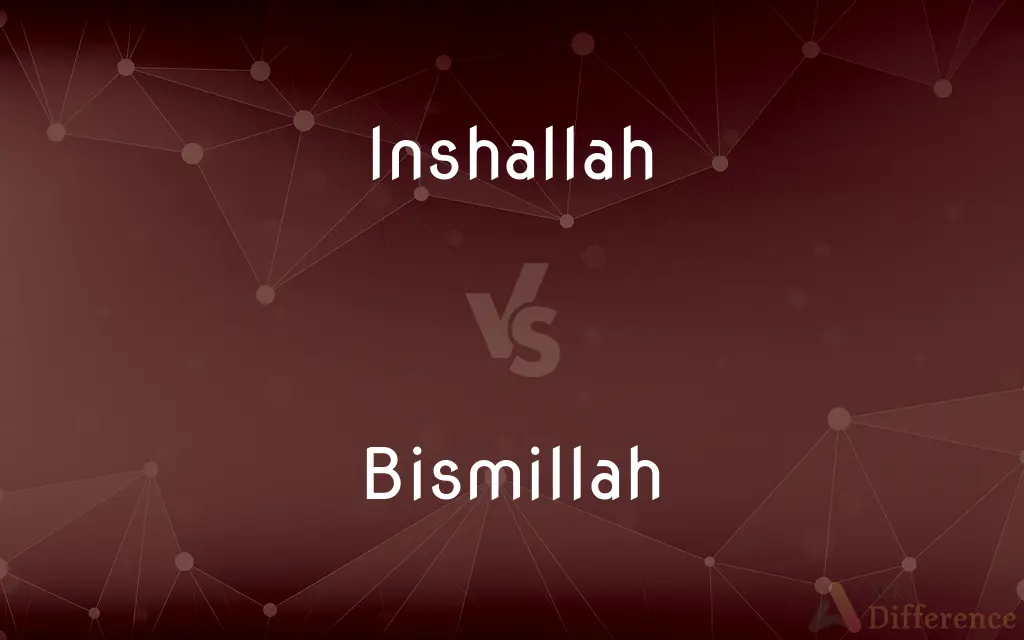Inshallah vs. Bismillah — What's the Difference?
By Fiza Rafique & Maham Liaqat — Updated on March 28, 2024
"Inshallah" means "if God wills," expressing hope for a future event, while "Bismillah" means "in the name of God," invoked before starting any action for blessings and guidance.

Difference Between Inshallah and Bismillah
Table of Contents
ADVERTISEMENT
Key Differences
"Inshallah" is an Arabic phrase used to refer to future events, with a meaning akin to "if God wills" or "God willing." It reflects a speaker's hope or intention to undertake an action, acknowledging that all outcomes are subject to God's will. "Bismillah," on the other hand, is another Arabic phrase that translates to "in the name of God." It is commonly recited before beginning any task, seeking God's blessings and guidance for the undertaking.
While "Inshallah" is associated with the future and the uncertainty that it holds, emphasizing the belief in divine predestination, "Bismillah" is invoked at the commencement of an activity as a way of dedicating the effort to God, highlighting the importance of seeking divine favor and protection. "Inshallah" can be used in conversation to express plans or intentions, often conveying a sense of humility and recognition of God's overarching control. Meanwhile, "Bismillah" is recited as a ritualistic invocation, used not only in daily activities but also in religious practices to purify intentions and seek success from a higher power.
The use of "Inshallah" often implies a deference to the future and a submission to God's plan, allowing individuals to express hope while acknowledging that everything happens by God's will. "Bismillah," however, is more about the present moment, marking the beginning of actions with a conscious appeal to God for support and guidance, thereby sanctifying the deeds that follow.
Despite their different applications, both phrases are deeply embedded in Islamic culture and religion, reflecting a life lived in accordance with faith. They embody the central Islamic tenet of reliance on and submission to God, whether looking forward to future outcomes or embarking on immediate endeavors. "Inshallah" serves as a reminder of the uncertainty of life and the ultimate authority of God over human plans, while "Bismillah" underscores the importance of starting every action with a clear and pure intention for it to be blessed and guided by God.
Comparison Chart
Translation
"If God wills" or "God willing."
"In the name of God."
ADVERTISEMENT
Usage Context
Referring to future events or intentions.
Invoked before starting any action.
Reflects
Hope and deference to God's will.
Seeking divine blessings and guidance.
Temporal Focus
Future-oriented.
Present moment, at the commencement.
Expression of
Humility and submission to divine predestination.
Dedication and sanctification of actions.
Cultural Significance
Emphasizes belief in divine control over future events.
Highlights the importance of starting actions with God’s name for blessings.
Religious Context
Common in conversations about future plans.
Ritualistic invocation in both daily and religious practices.
Compare with Definitions
Inshallah
Expressing hope for a future occurrence, subject to God's will.
I will graduate next year, Inshallah.
Bismillah
Invoked to seek blessings before beginning any task.
Bismillah, I start my journey.
Inshallah
Reflects a mindset of humility and faith.
Inshallah, we will see better days.
Bismillah
Reflects a tradition of sanctifying daily routines.
Bismillah, as we clean the house.
Inshallah
Emphasizes the belief in predestination.
He will recover from his illness, Inshallah.
Bismillah
Signifies the start of all actions with a positive note.
Bismillah, let’s start cooking.
Inshallah
Can imply deference to the future.
We will start the new project, Inshallah.
Bismillah
A declaration of faith and dependence on God.
Bismillah, before taking the exam.
Inshallah
Used to acknowledge uncertainty and submit to divine will.
We plan to meet tomorrow, Inshallah.
Bismillah
Used to purify intentions and actions.
Bismillah, we commence our meeting.
Inshallah
In sha'Allah (; Arabic: إِنْ شَاءَ ٱللَّٰهُ, ʾin šāʾa -llāh Arabic pronunciation: [ʔin ʃaː.ʔa‿ɫ.ɫaːh]), also spelled In shaa Allah, is an Arabic language expression meaning "if God wills" or "God willing". The term is mentioned in the Quran[Quran 37:102] which required the use of it when speaking on future events.[Quran 18:23–24].The phrase is commonly used by Muslims, Arab Christians and Arabic-speakers of other religions to refer to events that one hopes will happen in the future.
Bismillah
Alternative case form of Bismillah.
Inshallah
God willing.
Bismillah
An adjuration or exclamation common among the Mohammedans.
Inshallah
Expressing the speaker’s wish for a given future event to occur and/or their emphasis on its contingency upon the divine will.
We will sign the contract tomorrow, inshallah.
Inshallah
Expressing a skeptical affirmative, to indicate the unlikeliness of events, as if they need a divine intervention to come about.
Common Curiosities
When should one say "Bismillah"?
"Bismillah" should be said at the beginning of any task or activity, as a way of dedicating the effort to God and seeking success and protection.
Can "Inshallah" be used to express uncertainty?
Yes, "Inshallah" can express uncertainty about future events, highlighting a recognition that only God knows what the future holds.
What does "Bismillah" mean?
"Bismillah" means "in the name of God," recited before beginning any action to seek divine blessings and guidance.
When is "Inshallah" used?
"Inshallah" is used when discussing future plans or intentions, acknowledging that the realization of these plans is subject to God's will.
Is "Bismillah" only used by Muslims?
While "Bismillah" is predominantly used by Muslims, it can also be appreciated by people of other faiths who recognize the importance of seeking divine favor.
What is the cultural significance of "Inshallah"?
"Inshallah" holds significant cultural importance in Islamic societies, symbolizing faith in God's plan and humility before the divine.
Is "Bismillah" a prayer?
"Bismillah" can be considered a short prayer or invocation for God’s blessings and protection before starting any action.
What does "Inshallah" mean?
"Inshallah" means "if God wills," used when speaking about future events to express hope and submission to God's will.
Can "Bismillah" be used in non-religious contexts?
Yes, "Bismillah" is used in both religious and everyday contexts, as Muslims seek God's blessings in all aspects of life.
How do "Inshallah" and "Bismillah" reflect Islamic beliefs?
Both phrases embody Islamic principles of submission to God's will ("Inshallah") and starting actions with God’s name for blessings ("Bismillah").
Why do people say "Inshallah" even for likely events?
Saying "Inshallah" for likely events reflects a cultural and religious practice of attributing all outcomes to God’s will, regardless of their likelihood.
How does "Bismillah" affect one’s actions?
Reciting "Bismillah" is believed to bring divine blessings, protection, and success, affecting one’s actions by starting them with a positive and sanctified intention.
Can "Inshallah" be seen as non-committal?
In some contexts, "Inshallah" might be perceived as non-committal, but traditionally, it is a genuine expression of hope within the framework of God's will.
Do "Inshallah" and "Bismillah" have the same purpose?
While both phrases are deeply rooted in faith, "Inshallah" is about submission to God's future will, whereas "Bismillah" is about seeking immediate blessings for actions.
How do "Inshallah" and "Bismillah" enrich the Islamic cultural landscape?
These phrases enrich the Islamic cultural landscape by embedding spiritual awareness, humility, and a constant reminder of God’s presence in daily life and future plans.
Share Your Discovery

Previous Comparison
Telegram vs. Cable
Next Comparison
Que vs. QAuthor Spotlight
Written by
Fiza RafiqueFiza Rafique is a skilled content writer at AskDifference.com, where she meticulously refines and enhances written pieces. Drawing from her vast editorial expertise, Fiza ensures clarity, accuracy, and precision in every article. Passionate about language, she continually seeks to elevate the quality of content for readers worldwide.
Co-written by
Maham Liaqat















































